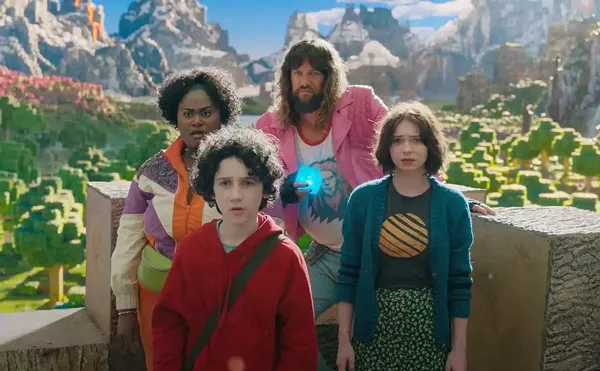By now, just about every critic has sung the praises of what will forever be known as “the gay cowboy movie.” They’ve noted Heath Ledger’s subtly emotive, taciturn performance. They’ve mentioned director Ang Lee’s trademark skillful handling of mood and atmosphere. They’ve used words like “daring,” “groundbreaking” and “revolutionary.” But what most of them fail to mention is that, at least for its first third or so, Brokeback Mountain is really fucking hot.
Watching Ledger and Jake Gyllenhaal meet in a drunken stupor, paw at each other in the dark and then rut like wild boars in the night may not exactly qualify as a special effect, but it’s certainly as amazing — and, given the actors involved, as unbelievable — a sight as anything in King Kong or The Chronicles of Narnia. As the hired ranch hands Ennis Del Mar and Jack Twist, Ledger and Gyllenhaal don’t portray the measured, cautious courtship we’re accustomed to seeing in most “major” Hollywood films about gay love. They attack each other like feral animals, and after it’s over, they frolic around shirtless, wrestling like bear cubs when they’re happy, and jabbing punches at each other when they’re scared or confused. It’s like an episode of Mutual of Omaha’s Wild Kingdom, with two impossibly gorgeous actors playing the wildlife.
Lee is a smart director: He knows his audience will walk into the theater with a certain set of expectations, and, as such, Ennis and Jack’s coupling isn’t treated as a shock or surprise so much as an inevitability. Meeting for the first time when they’re assigned to tend to a herd of sheep, the two don’t exactly shoot each other knowing gazes so much as they wordlessly size up each other; Lee helps them by loading the movie with pregnant pauses and carefully framed poses.
Of all the masterful sequences the film, the most stunning might be when the director manages to capture Jack straining not to check Ennis out as he undresses, out of focus, just over Jack’s shoulder. This is, after all, a movie about two already uncommunicative men overcome by a desire they’re too afraid to even mention — they repeatedly refer to it as “this thing” — and the indelible opening stretch of the movie goes a long way in sustaining interest in the simmering, decades-spanning affair that follows.
When Brokeback finally comes down off the mountain, it settles into the more predictable — but no less heartbreaking — trajectory of classic melodramas like The Last Picture Show or Giant. As the years pass, the cowboys both take wives and have children — Ennis with the plain, soft-spoken Alma (Michelle Williams) and Jack with the brash rich girl Lureen (Anne Hathaway). But when Jack stops by for a visit, the two men can barely contain themselves, and so begins an intermittent, clandestine affair conducted under the cover of “fishing trips.”
The screenplay — adapted by Diana Ossana and Larry McMurtry from E. Annie Proulx’s short story — doesn’t shy away from exploring how two essentially gay men can successfully play straight in order to fit in, and the irreparable, insidious emotional damage it does to their families. Much of the dialogue in the movie is mundane and functional, occasionally dipping into pseudo-poeticisms that, in another director’s hands, would be laughable. “Ain’t no reins on this one,” the men acknowledge at one point. But that’s as it should be: The film lingers long enough to give the feeling of real life, and Ledger in particular underplays all of the lines that a lesser actor would punch up.
It will disappoint some and comfort others to know that Brokeback Mountain isn’t all about gay sex. As the decades pass, the mustaches and clothing become more garish — Hathaway’s campy Dolly Parton wardrobe almost becomes a character of its own — but Ennis and Jack’s romance settles into a pensive, intimate rhythm. This is the film at its most subversive, showing Jack and Ennis nuzzling after sex, or sharing a joint, or arguing about what to do with their futures. Struggling to enjoy all of the things that straight people take for granted, the two seem, by the end, like an old married couple. In a way, the film argues, that’s exactly what they are.
Main Art Theatre, 118 N. Main St., Royal Oak; 248-263-2111.
Michael Hastings writes about film for Metro Times. Send comments to letters@metrotimes.com.






